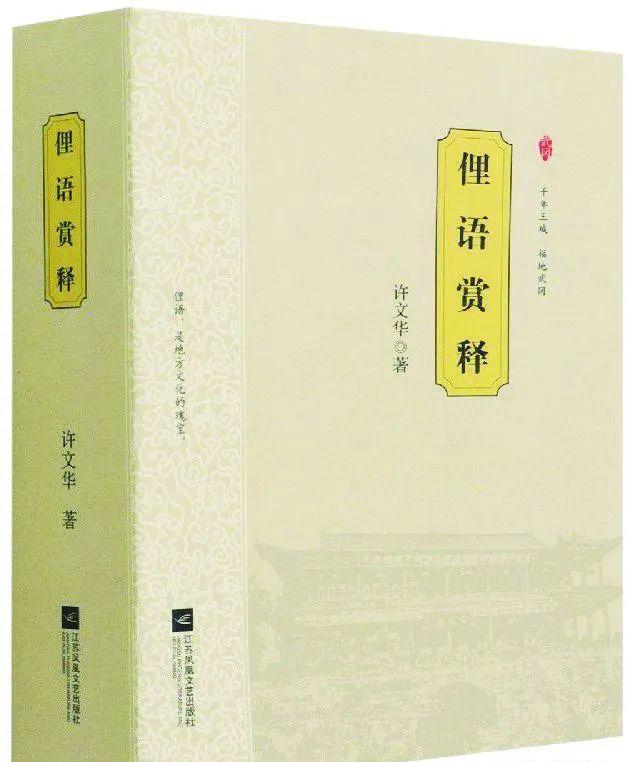..........................................................................................................................................................................................................................................................................................................
The Fun of Slang - Reading Xu Wenhua's "Appreciation of Slang"
Lin Rixin

Some time ago, I went to a meeting of the Wugang Writers Association, and Cao Juwen, vice chairman of the Wugang Municipal Federation of Literature and Literature, introduced Xu Wenhua to me, saying that he published a book "Slang Appreciation" in Jiangsu Phoenix Literature and Art Publishing House in August this year, collecting, interpreting, and sorting out the local slang into a book, and suggesting that I recommend it to readers... The next day, Xu Wenhua delivered his new book to me. The book was thick, nearly eight hundred pages, heavy in the hand.
Xu Wenhua, a native of Wugang City, has been engaged in rigorous court work for a long time after graduating from university, and in his spare time, he likes to pour his usual thoughts and feelings into his pen, and often has essays and comments published in the provincial and municipal court network cultural garden. He was influenced by the culture of southwest Hunan since he was a child, and was particularly sensitive to slang and other languages, and found slang vivid, humorous and interesting. As soon as he heard someone say a very interesting slang, he remembered it in his heart, and sometimes even remembered it in the small book he carried with him- it had the style of Jia Dao, the "bitter bard" of the Tang Dynasty. In hindsight, he would think about the art of slang terms, tracing the context in which it arose and its historical or practical significance. For more than 30 years, he has been persistent, collecting and sorting out a total of 570 slang articles in southwest Hunan Province, and interpreting and appreciating slang at multiple levels and in many aspects with profound cultural skills and social common sense. "Appreciation of Slang" shows the regional cultural heritage, folk customs and social development style from the level of terminology. Its appreciation mode of "word interpretation, interpretation, art and practical significance, and language examples", especially the setting of "language examples", allows people who do not usually dabble in the Wugang dialect to read, understand and apply.
What is slang? Simply put, it is a colloquialism in dialects. Slang is a folk informal, more colloquial sentence, with strong regional and more lifelike characteristics. Slang Appreciation has the following characteristics in terms of slang collection, stylistic setting and use case presentation:
First of all, the slang of this book is varied and informative. The 570 slang words in this book include words, idioms, idioms, idioms, afterwords, proverbs, colloquials, etc., in nature; from a formal point of view, they include two-syllables, trisyllabic words, tetraphonic words, single sentences, and compound sentences. For example, "eat salty", Mingli said that people's tastes are heavy, but in fact it refers to making money in business or using improper means to seek benefits; "putting style, when not a dumb style", means that it is only a routine and does not practice the skill, it is not as good as a person who has not practiced a routine but has brute force; "your family has gold and silver, and there is a scale next door", which means that there is money and do not be arrogant, people know the amount and source of your family's wealth.
Secondly, the style analysis of this book is in place and very practical. On the basis of the interpretation of slang (including the interpretation of difficult words, the analysis of the original meaning, and the elaboration of the meaning of the term), the editors of this book have a more detailed discussion of its "artistic and practical meaning": first explain its original meaning literally, then extend and diverge, prompt its practical significance, and finally give examples. Layer by layer, in-depth and simple, so that readers can easily and comfortably understand.
Third, the context of this book is scientific, and the language is easy to understand. Like "pouring down the yard and hitting the oil", the author sets the phrase for it: "You want to make furniture, please ask the wool carpenter to make it." He is the most material-efficient, 'pouring down the yard to beat the oil'. Another example is "the axe head shell hammer does not come off", the author sets the phrase for it: "His bad habit of a cigarette after a meal is 'the axe head shell hammer does not come off'." "This kind of language is concise, popular, and simple, and it is effortless to understand both local readers and readers from other places." Most of the slang examples in this book have the advantage of being easy to understand, highlighting the author's skill.
In today's context of vigorously promoting universal language, the space for slang to exist will become smaller and smaller, and the scope of circulation will be reduced day by day, and even gradually disappear. However, slang is a treasure of folk culture, containing many philosophies of life and ways of dealing with the world. Learn Mandarin well and don't forget the local dialect! The protection of slang is imminent. Moreover, the promotion of Mandarin and the protection of dialects are not contradictory, in this pluralistic society, Mandarin, dialects can coexist, integrate and develop together. Sometimes being able to speak in tongues can bring unexpected conveniences to work, play, and research.
Xu Wenhua's collection, collation, editing, and publication of "Appreciation and Interpretation of Slang" has far-reaching practical and historical significance, and his efforts are worthy of recognition and admiration.
(Lin Rixin, Vice Chairman of Wugang Writers Association)
............................................................................................................................................................................................................................................................................................................